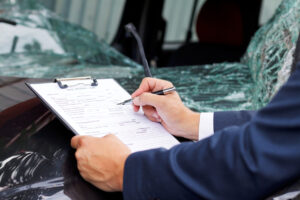
Were you or a family member injured in a car accident in Metairie, LA? You may be entitled to financial recovery from anyone who shares the blame for the collision. An experienced Metairie car accident lawyer at the Law Office of John W. Redmann, L.L.C. can help you get full compensation for bills, lost wages, and your personal pain and suffering. Call us today at (504) 500-5000.
Our lawyers have over 30 years of experience handling complicated matters. We have the tools to help you get what you need and deserve.
Recovering full compensation after an injury can be critical. If you were injured, contact our law office in Metairie, Louisiana to schedule a free case review today with a Metairie car accident attorney.
How Can the Law Office of John W. Redmann, L.L.C. Help Me Recover Compensation After a Car Crash in Metairie?

Insurance companies don’t make it easy to obtain a just outcome. They often create roadblocks that can discourage victims from fighting for a just deal. Of course, they have the ability to fight for months or even years. Many back down to avoid the hassle.
If you were injured and it wasn’t your fault, our Metairie personal injury lawyers at the Law Office of John W. Redmann, L.L.C. are here to help. We have the skills and resources to help you even the playing field.
When you choose us for your legal representation, we will:
- Conduct a detailed investigation
- Gather and analyze evidence
- Work with leading experts as we work to build the strongest case possible
- Handle all paperwork and communications
- Negotiate for a full settlement
- Take your case to court if necessary
Insurance adjusters have so many tricks up their sleeves. Our Metairie car accident attorneys understand every one of them. To learn more about how we can fight to maximize your compensation after an accident, call for a no-cost case review today.
Why Should I Hire a Car Accident Lawyer?
Clients who have car accident lawyers tend to have an easier time recovering just compensation.
Here are just a few reasons to consider hiring a lawyer:
- Your lawyer will simplify the legal process
- You can rest assured that you know all of your legal options
- Your lawyer will communicate with the insurer
- Law firms have access to experts who can help establish your case
- You might not know exactly what your case is worth, and your lawyer can accurately assess its value
- Insurers love to blame victims, and your lawyer can defend you
- You should be focused on your recovery–your lawyer can deal with the legal issues and give you time to rest and heal
While there are situations where you might not need a lawyer, it never hurts to speak with one. Like most law firms, we provide case evaluations so you can get the information you deserve.
What Types of Damages Can I Recover if My Car Accident Claim Is Successful?

In Louisiana, compensatory damages are classified as economic or non-economic damages.
Economic Damages:
While the exact economic damages you can obtain will depend on the specific losses you’ve incurred, common examples include the following:
- Current medical bills
- Future treatment expenses
- Lost wages
- Lost earning potential
- Vehicle repairs and other property damage
In short, you can be compensated for any financial costs you have incurred.
Non-Economic Damages:
Some of the most devastating losses suffered have nothing to do with money.
Examples include:
- Physical pain and suffering
- Emotional distress
- PTSD
- Diminished quality of life
- Physical disfigurement and scarring
- Loss of consortium
These damages do not have a clear price tag. That doesn’t make them any less important. When it comes to putting a dollar value on your non-financial losses, we often bring in experts who can testify about how the injury has changed your life. We’ll also compare your case to others we’ve handled in the past.
Am I Entitled to Seek Punitive Damages?
Punitive damages are rare in Louisiana. They’re typically only available when there is gross misconduct or intentional wrongdoing. For example, if you were severely injured because of a drunk driver or in a hit-and-run, the judge may award punitive damages as punishment.
How Long Do I Have to File a Personal Injury Lawsuit After a Car Accident in Louisiana?

Every state has a time limit for initiating lawsuits after an injury. In Louisiana, the statute of limitations is typically only two years. After two years from the date of the accident, you lose the opportunity to seek justice in court. There are few exceptions.
There are many reasons for this deadline. As time passes, evidence tends to disappear, and memories start to fade. That can make it extremely difficult to show what really occurred.
Therefore, if you believe you have a valid claim, it is critical to act quickly. Consulting a lawyer sooner rather than later significantly increases your chances of recovering financially.
Understanding Louisiana’s Fault System in Car Accidents

Louisiana has pure comparative negligence laws. You do not lose all of your compensation if you share some fault for the accident. In fact, you only lose your right to recover entirely if you were 100% responsible.
However, if you share even some blame, your money will be reduced. For example, if you’re found to be 40% liable, you’re only entitled to 60% of your settlement or verdict.
While some receiving some money will help, you do not have to take insurance allegations at face value. Remember, your settlement or verdict will only be reduced if the at-fault driver can prove you were partly responsible. Insurers do not always have the evidence to back up their accusations. If someone is blaming you, it is particularly important to have a skilled lawyer representing you.
We Handle All Types of Car Accident Claims in Metairie
Because we have decades of experience, our team at the Law Office of John W. Redmann, L.L.C. handles any type of car accident case, including those involving:
Rear-End Crashes

Rear-end wrecks are extremely common. That doesn’t mean that they’re all fender benders. If you were rear-ended in Metairie, we are prepared to help you get every dollar you deserve.
Rollovers

Rollover accidents tend to involve trucks, SUVs, and other top-heavy vehicles. Both the vehicle manufacturer and a third-party might share blame for the accident. You can count on us to bring in experts, evaluate the facts, and make sure we demand financial recovery from all parties who share the blame.
Head-On Collisions

Head-on collision are among the worst crashes imaginable, often involve high speeds and tremendous force. These crashes frequently result in serious injury and death. If you were injured in a front-impact accident, our Metairie head-on collision lawyers can help you get justice from the other driver.
Fatal Car Accidents

Deadly incidents leave survivors struggling with an unimaginable loss. Bringing a wrongful death claim is often the only way to hold the at-fault party accountable. We are well-equipped to help you pursue justice. We’ll gather any available evidence to prove liability and help your family get the money you need to move forward.
Our attorneys also work on car accident cases involving:
- U-turn accidents
- Multiple vehicle accidents
- Single-vehicle accidents
- Highway accidents
- Intersection accidents
- Accidents involving uninsured/underinsured motorists
- Hit-and-run crashes
- Parking lot accidents
- Speeding accidents
Regardless of how you were hurt, you could be facing an uphill battle when it comes to recovering what you deserve. We are ready to deal with the legal issues. Even if you are still recovering, call our team for a non-obligation evaluation today.
What Are the Most Common Causes of Car Accidents in Metairie?
Accidents occur for all different reasons. They’re much more likely to occur, however, when drivers are careless or reckless. In other words, accidents occur when people are negligent.
Some more specific causes of car accidents include:
- Speeding
- Texting while driving
- Distracted driving
- Failure to yield the right-of-way
- Tailgating
- Driving under the influence of drug or alcohol (DUI)
- Aggressive driving
- Unsafe passing
- Dangerous turns
- Lane changes
- Running a red light or stop sign
Some factors may be outside of the drivers’ control. Hazardous road conditions, poorly marked construction zones, and even poor lighting can all contribute to an accident. Our attorneys in Metairie can help you identify the at-fault parties and seek justice.
Statistics on Car Accidents in Metairie

According to data compiled by Louisiana State University, 823 people died in car accidents throughout Louisiana in 2023. 33 of those deaths occurred in Jefferson Parish.
While these might seem like small numbers, over 60,000 people were injured in car wrecks statewide that year. In Jefferson Parish alone, at least 4,834 people were injured in auto accidents. Read more on these statistics here.
Common Types of Car Accident Injuries
Because car accidents occur in different ways, they can also cause a wide range of injuries. These can be mild, moderate, or life-changing and severe.
At the Law Office of John W. Redmann, L.L.C., we often work with victims who have suffered the following:
- Fractures
- Nerve damage
- Whiplash
- Soft tissue damage
- Traumatic brain injury
- Spinal cord injuries and paralysis
- Concussions
- Back injuries
- Burns
- Amputations
Car Accident FAQs
How Much Does it Cost to Hire a Car Accident Lawyer?

Like most personal injury law firms, we work on a contingency fee basis. That means you do not have to pay anything if your lawyer fails to win your case. When your lawyer does win, they receive a set percentage of your settlement or verdict.
This fee structure is meant to ensure that you can afford a seasoned lawyer. There are never upfront fees or retainers.
What Should I Do After a Car Accident in Metairie?
First, you should always remain at the accident scene (or move the vehicles to a safe spot nearby, if possible). Leaving the scene of an accident is a crime in Louisiana.
You should also:
- Call 911 and report the accident. Under Louisiana law, you must report the accident if it causes injury, death, or over $500 in property damage. The 911 operator can also send an ambulance to the accident scene if someone requires emergency care.
- Exchange information. Exchange insurance information and contact details with the other driver. If any witnesses stopped to help, get their contact information too.
- Collect evidence. Document the accident scene. Take photos and videos of the vehicle damage and the area around you.
- Don’t admit fault. Many instinctively apologize for their actions after an accident. Anything you say can be used to hurt your case–and you might not fully understand what happened.
- Be careful about insurance statements. You should also refrain from making a recorded or signed statement until you’ve talked to a lawyer.
- Seek medical attention. Prompt care is, of course, critical to your physical recovery. It is also important to your case. If you wait too long to see a doctor, the at-fault party will probably say that something other than the accident caused your injuries.
Even if you aren’t sure whether you have a case, it is always a smart idea to call a lawyer for help. Like most accident lawyers in Metairie, the Law Office of John W. Redmann, L.L.C. offers free case reviews, so there’s never any risk in calling.
Will My Car Accident Case Go to Trial?
Most cases are settled out of court without the need for a trial. Your lawyer will negotiate with the insurance companies, and when you get a favorable deal, you’ll release them from all further liability.
However, it may be necessary to go to court if:
- Your claim is denied
- They make a lowball offer and refuse to reach a fair deal
- There are serious questions about who is responsible
Even if you do file a lawsuit, it is entirely possible that your case will settle before trial. This process can be lengthy and expensive–and merely initiating a lawsuit can motivate the insurers to negotiate more fairly.
How Much Compensation Can I Recover By Filing a Car Accident Claim in Metairie?
All personal injury cases are extremely unique. We really won’t know what your case is worth until we dig into the facts.
That said, some factors are relevant in almost every personal injury case:
- The extent and severity of your injuries
- Treatment expenses
- Your expected future expenses, considering care, rehabilitation, and other expenses
- Whether you lose income while you’re recovering
- Damage to your quality of life
- Whether you share the blame
- Policy limits
Each claim is highly fact-sensitive. It’s important to consult a lawyer who will dedicate the time and effort to accurately assess your case value. Otherwise, you could walk away with less than you deserve.
Call an Experienced Metairie Car Accident Attorney for a Free Initial Consultation Today

Do you have questions about your legal rights? Our team at the Law Office of John W. Redmann, L.L.C., is standing by to discuss your options. We know that recovering compensation can make a world of difference after an injury.
Remember, strict deadlines limit the amount of time you have to take act in Metairie, LA. Contact a skilled Metairie car accident lawyer today to get the help you need to move forward.
Recent Car Accident Blog Posts
Car Accident Resources
Additional Resources
- Louisiana DOTD
- Louisiana State Police
- Stay Safe – Jefferson County
- Distraction.gov
- National Safety Council
- US Department of Transportation
- National Highway Traffic Safety Administration
Highly Rated Auto Repair Shops
- Shawn’s Auto and A/C Repair – 3225 26th St, Metairie, LA 70002
- Complete Automotive Repair Service – 2715 N Hullen St, Metairie, LA 70002
- Meineke Car Care Center – 3125 N Causeway Blvd, Metairie, LA 70002
*Disclaimer – we do not endorse these companies or profit from having them listed on our website. These were some of the highest-rated auto repair shops on Yelp.
What Our Clients Are Saying About Us

Read more of our reviews here.
Visit Our Car Accident Law Office in Metairie, LA
The Law Office of John W Redmann, LLC Metairie
2901 N Causeway Blvd STE 202, Metairie, LA 70002
(504) 500-5000
24/7
Our Personal Injury law firm in Metairie also provides:
- Metairie Bicycle Accident Lawyers
- Brain Injury Accident Attorneys in Metairie, LA
- Car Accident Attorneys in Metairie, LA
- Metairie Catastrophic Injury Lawyers
- Dog Bite Accident Lawyers in Metairie, LA
- Motorcycle Accidents Lawyer in Metairie, LA
- Metairie Pedestrian Accident Lawyers
- Slip and Fall Accident Lawyers in Metairie, LA
- Truck Accident Attorneys in Metairie, LA
- Wrongful Death Lawyers in Metairie
- Workplace accidents Attorney in Metairie
- Medical Malpractice Attorneys in Metairie
- Mass Tort Attorney in Metairie, LA
- Bus Accidents Attorneys in Metairie, LA
- Uber & Lyft Accidents Lawyer in Metairie, LA
Metairie Car Accident Infographic


